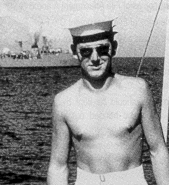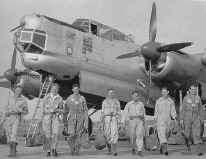Bob Gibbs - HMAS Quickmatch

Bob GibbsI joined the Navy at 17 in 1956, and served in Malayan waters on HMAS Quickmatch in 1956 and 1957.
We didn't see action in the sense that we were attacked, but we were in the war zone. There were several fatalities among men - and these are not on the Roll of Honour, and I think they should be. We'll keep fighting to get them on one day.
We were always busy - there were regular four-hourly watches, and then there was plenty of maintenance and cleaning jobs to carry out during other times, training exercises with other ships, and such. So it could have been boring, but we were always busy.
We did our bit - basically blockading the area, keeping potential enemy supplies by sea out of the picture, and stopping potential disruption of the busy commercial sea lanes by mines. We were unnoticed, but successful.
Colin Bannister - 3RAR
Problems with mites and mosquitoes
Malaria was the main concern. ... On patrol in the jungle it was sleeves down all the time and mosquito lotion sloshed on exposed skin all the time. Mosquito nets for sleeping were a necessity except on patrol where they were not only bulky but cumbersome to get out of in a hurry in the dark.
Mites were the carriers of unpleasant things like typhus so anti-mite fluid ... had to be rubbed into the seam of shirts and trousers and then reapplied periodically to counter the fluid's dilution through rain, sweat and washing.
The enemy (CTs)
The CT (Communist Terrorist) soldier was well used to living in the jungle. ... Food and other supplies came from the jungle gardens of the fringe squatters and surrounding kampongs (villages). He had jungle workshops to repair his weapons and equipment, jungle hospitals for first aid treatment, a network of agents and sympathisers in village, town and city, and a cowed rural population to coerce for food, money, information and sanctuary. His discipline, fieldcraft, navigation and minor tactics were good and his weapon handling adequate. He relied on surprise in ‘hit and run’ tactics such as the ambush and, (initially) could be ruthlessly cruel in murdering, mutilating or kidnapping people of influence and their families - village headmen, teachers, local government officials.
Waiting in ambush
Squirming to get comfortable, there's time to become familiar again with the local vegetation as darkness descends and the mosquitoes try to penetrate your clothes and the lotion on your skin. After a while legs get numb, arms ache and the mind wanders. Suddenly there's a noise and the skin tingles and the heart thumps but no shadowy figure comes into view and slowly you relax. Animals were often the cause of spring or premature ambushes, particularly at night when pigs, monkeys or deer could blunder into the site.
Returning from patrol
But when they were home sweet home, with loving wives to greet the returning warriors who by this time were rather hot, sweaty and smelly warriors. Ah, the bliss of climbing out of uniform whose starched pristineness had deteriorated into black sweat patches and creases, to shower, change, have a drink and think about what to do for the next few days. The (servants) would whisk away the soiled clothes and confer with ‘Mem’ about dinner that night while I would sit back in sheer content.
(Colin Bannister, An Inch of Bravery. 3RAR in the Malayan Emergency 1957-59. Directorate of Army Public Affairs, Canberra, 1994. p38, 50, 76, 80)
Spud Spurgeon - 1 Squadron, RAAF

I was a pilot in No 1 Squadron, flying Lincoln Bombers. I was 35 in 1956.
It was a funny war for us. It was safe in that there was no opposition from the air or the ground, but it was very hard to see let alone hit a target. ‘Going hunting’, we called it. The two or two and a half hour flights could get pretty difficult, but that was because of the weather - flying in a tropical storm can be very scary.
We would get the word that there was a target, then a marker aircraft would drop smoke, and we would try to hit the area. Well, we never were told the result of our raids. I don't suppose anybody really knew - it was usually too hard for anyone to get into the jungle to see what had happened. We know we hit an elephant once, and destroyed plenty of trees, but I don't know what else we might have hit.
But I'm sure we had an impact - we kept the CTs guessing and scared and isolated, and that was our main task, not to kill them.





